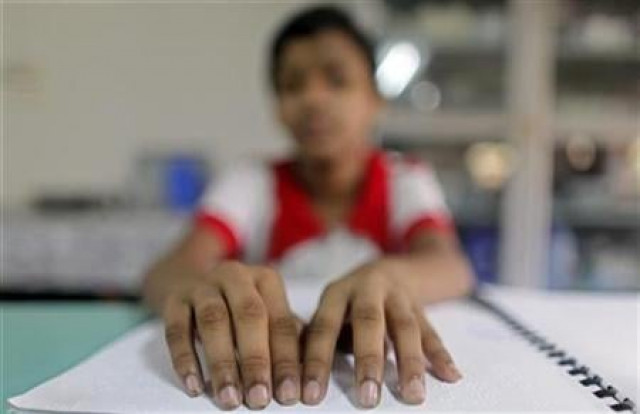Urban spaces inaccessible for visually impaired citizens
Tactile paving, audio signals are missing at roads, hospitals, airports, railway stations, educational institutions an

Even as Pakistan remains a formal signatory to various international conventions on human rights, the state has failed to integrate and fulfil the specific accessibility requirements of the blind community, which continues to live in the dark.
Muhammad Saleem, a visually impaired lecturer at a government institution in Lahore, felt that the government had failed to enforce international laws on the rights of persons with disabilities. "Neither are there any tactile tiles nor pelican crossings for blind persons in the city," said Saleem.
Hafiz Muhammad Arif, a disability rights activist, confirmed that crossing the roads was a difficult task for people with visual disabilities in the cultural capital. "In the absence of special arrangements, it is nearly impossible for blind people to cross the road without anyone's help. Even when some blind persons try to cross the road with a cane, most drivers refuse to stop and often hurl insults at them," observed Arif.
According to Professor Dr Muhammad Moin, Head of the Department of Ophthalmology at the Mayo Hospital, approximately 1.83 per cent of people in Pakistan are visually impaired however, no state department or non-governmental organization (NGO) has any data on the exact number of blind people in the province. "The number of blind people registered with the Punjab Social Welfare Department is 43,260," claimed Dr Moin.
Speaking of the province with a sizable population of blind persons, a senior official of the Traffic Engineering and Transport Planning Agency (TEPA) revealed on the condition of anonymity, that no special signals or tactile pavements have been installed for blind people to cross the roads nor has this ever been considered.
A survey conducted by the Express Tribune across major avenues in Lahore revealed shocking details. At the signal-free roads, people had to use an overhead bridge to cross the road, presenting a challenge for visually impaired people. Similarly, tactile tiles had not been installed at the Orange Line, Metrobus service, railway stations and bus stands to guide blind travellers. Tactile paving was also missing at the Allama Iqbal International Airport, which provided helpers for guiding visually impaired passengers.
According to Sadia Jabeen, senior civil engineer at the University of Karachi, tactile paving should be installed on roads, paths, sidewalks or public places throughout cities for the convenience of the blind people. "This is a special type of pavement, in which raised lines, domes or other tactile features are made to convey safety information to blind or visually impaired people. Larger domes or lines are used as stops, while thinner lines indicate that the path is safe to walk on. In this regard, the government should first implement tactile paving as a model on highways and government institutions in some areas so that blind people can move around easily," urged Jabeen.
While commenting on the state of infrastructure in Sindh, which is home to a blind population of at least 356,445 people, Sher Ali, leader of the Blind Action Committee, confirmed that government and private institutions, public hospitals, roads, airports, railway stations, bus stands, entertainment venues, and other places had no tactile paving. "For the blind person, there are only two means of movement. The cane and the helping hand," regretted Ali, who also highlighted the lack of employment opportunities available for blind people in the province.
The situation was no less regrettable in Khyber-Pakhtunkhwa (K-P), where despite the government fixing an employment quota of 2 per cent for differently-abled persons, visually impaired persons continued to be deprived of free movement due to inaccessible infrastructure.
In fact, popular public spaces like the airport, railway station, and even the NADRA office, and passport office still lacked specialized arrangements like tactile paving for blind citizens, who required assistance to identify the path and place.
"Unfortunately, there is no concept of installing tactile markings for visually impaired citizens in K-P. Due to the unavailability of audio signals, blind pedestrians have a hard time navigating through the city. The same is the case with hospitals and other important places which have no dedicated information desks for blind people," informed Awais Khan, a visually impaired teacher.
According to the Khyber-Pakhtunkhwa Social Welfare Department, K-P is home to approximately 149,917 differently-abled people, out of which 20,673 suffer from visual impairments, 20,637 have hearing impairments while 23,237 live with psychiatric ailments alongside a significant percentage of people with physical disabilities.
Qari Saad Noor, President of the Khyber-Pakhtunkhwa Imperiled Persons believed that the society at large was more or less insensitive to the unique struggles of people with disabilities. "There is no regard for blind people who walk with a cane in one hand. It is a pity that the government has still not bothered providing accessible infrastructure for visually impaired persons, who are unable to travel on their own in the absence of identification signals at roads and bus stops," lamented Noor.
Unsurprisingly, down south in Quetta too, the correspondent reported finding no tactile floor markings at public offices, bus stations, roadsides, hospitals and airports. In fact, Quetta's main train station also did not have any markings on the floor for blind individuals.
"The government is not serious about resolving the problems of blind people. It should prioritize the establishment of specialized infrastructural arrangements, which can facilitate the movement of blind people within our cities," concluded Sher Ali, a disability rights activist from Karachi.



















COMMENTS
Comments are moderated and generally will be posted if they are on-topic and not abusive.
For more information, please see our Comments FAQ